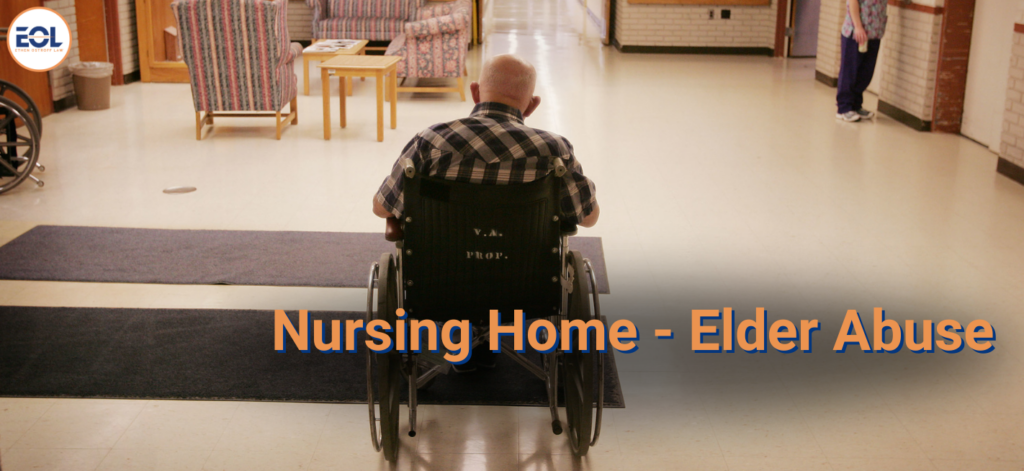Nursing Home Elder Abuse Lawyer | Ethen Ostroff Law
Elder abuse in nursing homes is a serious issue in the United States, impacting a large number of senior citizens. Recognizing signs of abuse and reporting any suspicions is crucial. If your loved one has been abused in a nursing home, seeking advice from an elder abuse lawyer, and considering legal action can help you seek justice and hold the facility accountable.
At Ethen Ostroff Law, we are committed to fighting elder abuse in nursing homes and offering the legal assistance you need during this difficult time. In this guide, we discuss the complexities of elder abuse cases, providing insights and guidance on navigating the legal process. From recognizing signs of elder abuse to taking steps against negligent facilities, we offer comprehensive information to help you seek justice for your loved ones.
Elder Abuse in American Nursing Homes
The mistreatment of elderly residents in nursing homes encompasses various forms of harm, including physical, emotional, or financial abuse, neglect, and exploitation. This distressing reality affects numerous care facilities nationwide, despite efforts to ensure resident safety. Findings on elder abuse in American nursing homes are concerning:
- Between 1 and 5 million seniors experience elder abuse annually, yet only one out of 24 cases are reported to authorities.
- Close to 10% of nursing home facilities were found to have violations that endangered elderly residents’ well-being.
Forms of Elder Abuse in Nursing Homes
In nursing homes, elder abuse manifests in various distressing forms, each requiring recognition and intervention. Here are the different types commonly observed:
- Emotional abuse: Includes verbal assaults, threats, or intimidation causing psychological distress.
- Financial exploitation: Involves the misuse of funds, property, or assets for personal gain.
- Neglect: Entails the failure to provide necessary care, resulting in health or safety risks.
- Physical abuse: Encompasses the infliction of pain or injury through hitting, pushing, or improper restraint.
- Sexual abuse: Involves non-consensual sexual contact or harassment.
These forms of abuse can have severe consequences for elderly residents and demand immediate attention and action.

Signs of Elderly Abuse
Keen observation and awareness are crucial for identifying elder abuse. Loved ones must stay vigilant for subtle changes in behavior, appearance, or living conditions. Common signs include:
- Emotional signs: Sudden changes in mood or behavior, withdrawal from social activities, depression, anxiety, or fearfulness.
- Financial signs: Missing belongings, unauthorized withdrawals from bank accounts, sudden changes in financial status, or exploitation of assets.
- Neglect signs: Poor personal hygiene, untreated medical conditions, malnutrition, dehydration, or unsafe living conditions.
- Physical signs: Unexplained injuries like bruises, welts, cuts, or fractures.
- Sexual abuse signs: Bruises, scratches, or injuries around the genital area, sexually transmitted infections, or sudden reluctance to be alone with certain individuals.
The Impact of Nursing Home Abuse on Elderly Residents
Nursing home abuse deeply affects elderly residents, impacting their physical, emotional, and financial well-being. This encompasses:
- Physical health decline: Abuse can lead to injuries, chronic pain, and worsen existing health conditions due to neglect or improper care.
- Emotional distress: Victims may experience fear, anxiety, and depression, damaging their self-esteem and causing social withdrawal.
- Financial loss: Exploitation makes elderly financially vulnerable, impacting their ability to afford necessities and undermining their independence.
- Increased vulnerability: Abuse weakens elders physically and mentally, making them more susceptible to further mistreatment.
- Legal and administrative burdens: Dealing with abuse involves complex legal processes adding stress and requiring significant time and resources.
- Trust issues: Abuse erodes trust in caregivers and loved ones, making elders hesitant to seek help or disclose mistreatment.
It’s essential to address nursing home abuse promptly and comprehensively to safeguard elders’ dignity and well-being.
Factors Contributing to Elder Abuse
Various factors contribute to elder abuse in nursing homes, both within the long-term care industry and among individual residents. These include:
- Caregiver stress: Family caregivers may experience significant stress when caring for ill or disabled parents, increasing the risk of mistreatment.
- Chronic illness and disability: Elder abuse is linked to chronic illness and physical disabilities, as individuals with disabilities often rely on others for assistance.
- Cognitive impairment: Residents with cognitive impairments, such as dementia, are more susceptible to abuse due to their decreased ability to communicate.
- Difficult behavior: Older adults with difficult behavior may be at risk of abuse due to aggressive reactions from caregivers or unmet emotional needs.
- Family dynamics: Larger families may experience higher rates of elder abuse, particularly towards older parents.
- Inadequate training: Caregivers may lack proper training in geriatric care and abuse prevention, making it difficult to identify signs of mistreatment.
- Lack of oversight: Regulatory oversight of nursing homes may be inconsistent, allowing abusive practices to go unchecked.
- Social isolation: Socially isolated and lonely older individuals are at greater risk of elder abuse, as the absence of social connections can hide abusive behavior.
- Substance misuse: Older individuals under the influence of alcohol or drugs are more vulnerable to abuse, as substance misuse impairs their ability to care for themselves.
- Understaffing: Nursing homes often struggle with understaffing due to budget constraints and high turnover rates, leading to inadequate supervision and rushed care.
Common Elder Abusers in Nursing Homes
Understanding elder abuse in nursing homes requires recognizing potential perpetrators. Abuse often arises from various sources in these environments, including:
- Caregivers and staff: Some staff members may mistreat residents due to stress or a lack of training.
- Contractors or providers: Individuals providing services may exploit residents’ vulnerabilities.
- Other residents: Abuse may occur between residents, especially if one is aggressive or has cognitive impairments.
- Visitors or family: While less common, visitors or family members may also be perpetrators due to conflicts or financial motives.
- Volunteers or temporary staff: Limited oversight can make temporary staff or volunteers potential abusers.

Factors Influencing Unreported Elder Abuse
Many cases of elder abuse in nursing homes go unreported or undetected due to several factors:
- Dependency on abusers: Victims may rely on their abusers for care, finances, or housing, feeling powerless to seek help.
- Fear of retaliation: Victims may fear reprisals from their abusers, discouraging them from reporting abuse.
- Isolation and alienation: Victims may feel disconnected from support networks, allowing abusers to exert control.
- Lack of awareness: Some elders may not know their rights or available resources, hindering them from seeking help.
- Shame and embarrassment: Feelings of shame may prevent victims from disclosing abuse, particularly in sensitive cases.
Supporting an Elderly Person Hesitant to Report Abuse
Supporting an elderly person who is hesitant to report abuse involves:
- Creating a safe environment: Establish a safe and supportive space where they can share concerns without fear.
- Educating about rights: Empower them with knowledge about their legal rights and available resources for reporting abuse.
- Encouraging communication: Foster an open dialogue and provide a non-judgmental space for them to express concerns.
- Exploring care options: Help explore alternative care arrangements if they rely on the abuser for assistance.
- Involving professionals: Seek assistance from healthcare professionals, social workers, or legal advisors specializing in elder abuse.
- Providing emotional support: Offer empathy and reassurance, ensuring they feel heard and valued.
- Respecting autonomy: Respect their autonomy and allow them to determine the best course of action for themselves.
Preventing Elder Abuse in Nursing Homes
Ensuring safety and well-being in nursing homes is crucial. Here are some practical ways to prevent elder abuse:
- Accountability: Check nursing home records and report concerns.
- Encourage reporting: Create an environment where everyone feels safe to speak up.
- Legal help: Seek assistance from an elder abuse attorney if needed.
- Open communication: Encourage open discussions about concerns.
- Rights advocacy: Stand up for your loved one’s rights and empower them to speak out.
- Regular reviews: Make sure care plans are regularly reviewed and updated.
- Regular visits: Visit your loved one often to monitor their well-being.
- Social engagement: Encourage participation in community activities.
- Staff training: Push for thorough training on elder abuse prevention.
- Stay informed: Learn about the signs of elder abuse to identify any mistreatment.
Where to Report Elder Abuse in Nursing Homes
Reporting nursing home elder abuse is essential for protecting vulnerable individuals. Here are some places where you can report such abuse:
- Adult Protective Services (APS): Contact APS in your state to report elder abuse in nursing homes. You can find their contact details on the National Adult Protective Services Association website.
- Legal assistance: Consider consulting an elder law lawyer for guidance on reporting elder abuse and understanding your legal options.
- Local law enforcement: If you suspect a crime, such as assault or financial exploitation, contact your local police to report the abuse.
- Long-term Care Ombudsman Program: Reach out to the ombudsman program for help with complaints about nursing home abuse. Use the Eldercare Locator to find your local program.
- National Center on Elder Abuse (NCEA): While they don’t investigate individual cases, the NCEA offers resources and links to state-specific reporting agencies and hotlines.
- State Survey Agency: Report elder abuse concerns your state’s agency responsible for nursing home inspections. They can investigate compliance with regulations.
Process for Reporting Nursing Home Elder Abuse
Reporting nursing home elder abuse involves these steps:
- Gather evidence: Collect any relevant documents or evidence, such as photos or witness statements.
- Contact authorities: Reach out to APS, the Long-Term Care Ombudsman Program, or local law enforcement.
- Provide details: Be ready to share specifics about the abuse, including who was involved and when it occurred.
- Stay involved: Follow up with the authorities to ensure your report is being addressed.
- Legal guidance: Consider consulting with an elder abuse lawyer for advice on your options.
- Support the victim: Offer emotional support and ensure they receive necessary care.
- Monitor progress: Stay informed about the investigation’s progress and any actions taken.

Resources Available for Elderly People Who May be a Victim of Abuse
Elder abuse victims have access to various support services:
- American Bar Association Commission on Law and Aging: Advocates for elder rights.
- Community services: Local agencies provide counseling, legal aid, and social activities.
- Counseling services: Specialized therapy for elder abuse victims.
- Eldercare Locator: Offers assistance for older adults and caregivers.
- Hotlines and helplines: National Domestic Violence Hotline (1-800-799-SAFE (7233)) provides 24/7 assistance.
- Legal assistance: Elder abuse lawyers offer advice and representation.
- NCEA: Provides resources and fact sheets for professionals and families.
- Support groups: Elder Abuse Prevention Center offers peer support groups.
- WHO Report on Tackling Abuse of Older People: Outlines priorities for combating elder abuse.
Legal Options for Abused Elderly in Nursing Homes
When dealing with elder abuse, consulting elder law specialists is crucial for tailored advice. Here are some legal options to consider:
- Alternative dispute resolution: Some contracts require arbitration for a quicker resolution.
- Civil lawsuits: Victims can sue the facility for compensation, covering medical expenses and pain and suffering.
- Criminal prosecution: Perpetrators may face fines or imprisonment for severe abuse.
- Family involvement and advocacy: Family members advocate for victims’ rights and support legal proceedings.
- Long-term care ombudsman: Ombudsmen provide guidance and support in addressing concerns.
- Medicaid recovery: Medicaid may seek reimbursement from settlements for covered expenses.
- Regulatory compliance lawsuits: Non-compliant nursing homes may face enforcement actions.
- Reporting to authorities: Complaints to state agencies prompt investigations and protective actions.
- Seeking legal advice: Consulting with lawyers for elderly abuse ensures an understanding of legal options.
Bringing an Elderly Abuse Lawsuit Against a Care Home
Bringing an elderly abuse lawsuit against a care home requires careful consideration, preparation, and legal expertise to navigate the complexities of the legal system:
- Initial consultation: Schedule a meeting with an elderly abuse lawyer to discuss concerns, evaluate your case, and explore legal options. The attorney will review abuse details, gather evidence, and offer guidance.
- Investigation: Conduct a thorough probe into abuse allegations, gathering evidence and interviewing witnesses. This helps build a strong case and identify liable parties.
- Legal strategy: Develop a tailored legal approach based on investigation findings. This may involve filing a civil lawsuit against the care home for damages.
- Settlement negotiations: Attempt to resolve disputes through negotiations for a fair settlement. Your elder abuse attorney will advocate for compensation and accountability.
- Litigation: If no settlement is reached, prepare for court proceedings. Your alder abuse lawyer will present evidence and argue your case before a judge and jury.
- Resolution: Seek compensation and closure. Holding responsible parties accountable can provide justice and validation for the victim and their family.
Common Claims in Nursing Home Elder Abuse Lawsuit
Common claims in elderly abuse cases may include:
- Emotional abuse: Verbal threats or humiliation causing distress.
- Falls and injuries: Unsafe environment leading to falls.
- Financial exploitation: Stealing money or property.
- Inadequate staffing: Overwhelmed caregivers unable to provide care.
- Malnutrition and dehydration: Inadequate nutrition or hydration.
- Medication errors: Incorrect dosage or missed doses.
- Negligence: Failure to provide proper care and supervision.
- Physical abuse: Intentional acts causing harm or injury.
- Violation of resident rights: Privacy infringements or improper restraints.
- Wrongful death: Death resulting from elder abuse.
Consulting an elder abuse lawyer is crucial for understanding legal options and pursuing justice.
Compensation in Elder Abuse Nursing Home Lawsuits
Compensation seeks justice for victims and holds negligent facilities accountable. It covers:
- Legal fees and costs.
- Loss of enjoyment of life.
- Medical expenses.
- Pain and suffering.
- Punitive damages.
- Wrongful death damages.
An elder abuse lawyer can guide victims and their families to seek fair compensation.
Hire Ethen Ostroff Law's Elder Abuse Lawyer
Dealing with elder abuse in a nursing home is tough. But at Ethen Ostroff Law, we get it, and we’re here to support you. We fight for the rights of elderly individuals who’ve faced mistreatment. If you or a loved one has been through this, contact Ethen Ostroff Law now at 610-510-8883 ( by calling this number, you consent to receive SMS updates from Ethen Ostroff Law) or Submit Form to get free consultation. Let’s stand against elder abuse and ensure our seniors are treated with respect.


